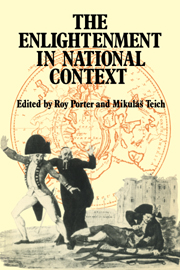Book contents
- Frontmatter
- Contents
- Preface
- 1 The Enlightenment in England
- 2 The Scottish Enlightenment
- 3 The Enlightenment in France
- 4 The Enlightenment in the Netherlands
- 5 The Enlightenment in Switzerland
- 6 The Italian Enlightenment
- 7 The Protestant Enlightenment in Germany
- 8 The Enlightenment in Catholic Germany
- 9 Reform Catholicism and Political Radicalism in the Austrian Enlightenment
- 10 Bohemia: From Darkness into Light
- 11 The Enlightenment in Sweden
- 12 The Russian Enlightenment
- 13 Enlightenment and the Politics of American Nature
- Afterword
- Notes to the text
- Further reading
- Index
Preface
Published online by Cambridge University Press: 24 September 2009
- Frontmatter
- Contents
- Preface
- 1 The Enlightenment in England
- 2 The Scottish Enlightenment
- 3 The Enlightenment in France
- 4 The Enlightenment in the Netherlands
- 5 The Enlightenment in Switzerland
- 6 The Italian Enlightenment
- 7 The Protestant Enlightenment in Germany
- 8 The Enlightenment in Catholic Germany
- 9 Reform Catholicism and Political Radicalism in the Austrian Enlightenment
- 10 Bohemia: From Darkness into Light
- 11 The Enlightenment in Sweden
- 12 The Russian Enlightenment
- 13 Enlightenment and the Politics of American Nature
- Afterword
- Notes to the text
- Further reading
- Index
Summary
The last two decades have seen a great revival in Enlightenment studies: the philosophes and their ideas are now taken seriously once more; their thought has been analysed with scholarly depth and precision by historians of ideas; new approaches have been pioneered; and the social history of the Enlightenment is at last being explored (witness for example Robert Darnton's studies of the relations between the ‘High’ and ‘Low’ Enlightenments).
In one important respect at least our grasp of the Enlightenment is still badly lacking. Comparatively little has been written about its geographical, social and political location as a cultural movement. Much of the historiography still treats the Enlightenment as systems of socially disembodied ideas. Because the philosophes proclaimed themselves cosmopolitans some historians have felt free to study them in isolation from their precise social and political milieus, while others have blithely presupposed that the Enlightenment was quintessentially a French bloom, cultivated at Les Délices and Paris.
There are obviously elements of truth in these approaches. But it is also important to grasp the many different forms the Enlightenment took in vastly different social and political environments. Stereotypes derived from the French Enlightenment – that it was atheistical in tendency, radical, sceptical, literary and salon-based – break down on confronting the very different roles which elites of enlightened intellectuals were playing elsewhere: as government servants, as church reformers, as popularizers of ‘civility’, as utilitarian political economists and technocrats.
- Type
- Chapter
- Information
- The Enlightenment in National Context , pp. vii - xPublisher: Cambridge University PressPrint publication year: 1981
- 1
- Cited by

